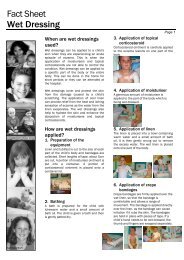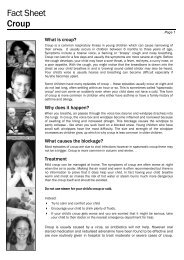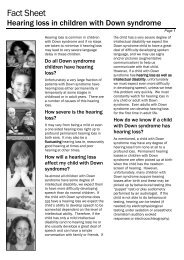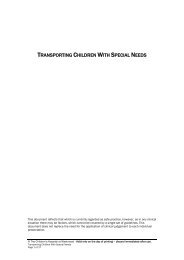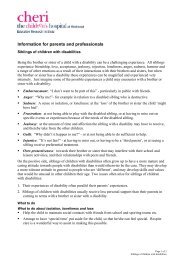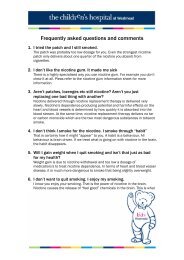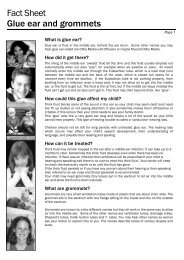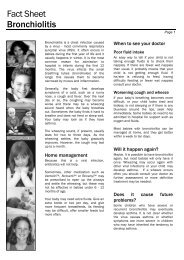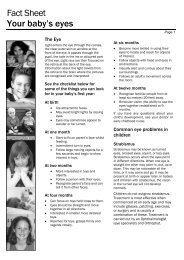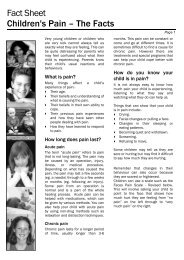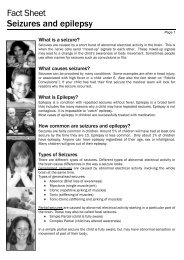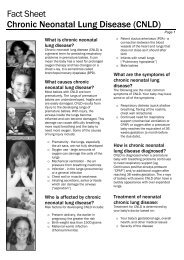Asthma Education Newsletter - Kids Health @ CHW
Asthma Education Newsletter - Kids Health @ CHW
Asthma Education Newsletter - Kids Health @ CHW
Create successful ePaper yourself
Turn your PDF publications into a flip-book with our unique Google optimized e-Paper software.
Welcome to the Winter <strong>Asthma</strong> <strong>Education</strong> <strong>Newsletter</strong><br />
for Parents and Carers. The <strong>Newsletter</strong> has been<br />
developed by the <strong>Asthma</strong> <strong>Education</strong> Service at the<br />
Children’s Hospital at Westmead (<strong>CHW</strong>) and is<br />
designed for parents and carers of children with asthma<br />
and contains up to date asthma information, medication<br />
updates and management tips.<br />
Patterns of Childhood <strong>Asthma</strong><br />
There are distinct patterns in childhood asthma that<br />
determine the level of treatment required. The pattern of<br />
childhood asthma is determined by the frequency of<br />
episodes and the day-to-day symptoms, rather than the<br />
severity of an acute episode.<br />
The medication used to treat asthma in children is<br />
determined by the pattern of your child’s asthma prior to<br />
commencing regular treatment and the level of asthma<br />
symptom control after commencing treatment. The<br />
National <strong>Asthma</strong> Council (NAC) provides a useful<br />
framework to help identify your child’s particular asthma<br />
pattern.<br />
Infrequent intermittent asthma<br />
This is the most common pattern and accounts for 70%<br />
to 75% of children with asthma. These children<br />
experience isolated episodes of asthma, which can last<br />
anywhere from one to two days up to one to two weeks,<br />
usually triggered by an upper respiratory tract infection<br />
(URTI) or environmental allergen. Episodes are usually<br />
more than six to eight weeks apart and these children<br />
are symptom-free in between episodes. The severity of<br />
infrequent intermittent asthma varies. Episodes are<br />
usually mild but children with this pattern account for<br />
60% of paediatric hospital admissions. Children with<br />
infrequent intermittent asthma are managed by using<br />
inhaled bronchodilators, such as Ventolin or Asmol, as<br />
needed. Regular preventive therapy is not<br />
recommended for children with this pattern of asthma.<br />
Frequent intermittent asthma<br />
This pattern accounts for approximately 20% of children<br />
with asthma. These children display a similar pattern to<br />
infrequent intermittent asthma but the interval between<br />
episodes is shorter, less than every six to eight weeks<br />
and commonly occurring during the winter months.<br />
These children may also experience minimal<br />
symptoms, such as occasional night time cough or<br />
Winter 2013<br />
exercise induced wheeze. Children with frequent<br />
intermittent asthma require inhaled bronchodilator as<br />
needed and may benefit from regular preventive<br />
therapy using non-steroidal preventers, such as Intal<br />
Forte or Singulair, or low-dose inhaled corticosteroids,<br />
such as Flixotide, Pulmicort, Qvar or Alvesco.<br />
Persistent asthma<br />
Approximately 5% of children with asthma have<br />
persistent asthma. Children with persistent asthma<br />
have acute asthma episodes but they also have<br />
symptoms on most days in the interval periods. These<br />
symptoms include sleep disturbance from wheezing or<br />
coughing, early morning chest tightness and exercise<br />
intolerance. Persistent asthma is further classified into<br />
mild, moderate or severe, depending on the severity of<br />
these symptoms. Children with mild persistent asthma<br />
are treated with inhaled bronchodilators as needed and<br />
regular preventer treatment with non-steroidal<br />
preventers or low-dose inhaled corticosteroids. Children<br />
with moderate to severe persistent asthma usually need<br />
inhaled corticosteroids or combination therapy, such as<br />
Seretide or Symbicort, or a combination of inhaled<br />
corticosteroids and Singulair to control their symptoms.<br />
Interval <strong>Asthma</strong> Symptoms<br />
Interval asthma symptoms are regular asthma<br />
symptoms that your child may experience between<br />
episodes. Interval symptoms can develop during<br />
particular times of the year, for example during autumn<br />
and winter, and result in an increase in use of inhaled<br />
bronchodilator.<br />
Interval symptoms to look for include:<br />
• Increasing night time wheeze, cough or shortness of<br />
breath<br />
• Sleep disturbance due to asthma<br />
• Early morning chest tightness<br />
• Change in activity patterns or intolerance to exercise<br />
• Need for extra inhaled bronchodilator<br />
•Increase in childcare or school absence due to asthma<br />
If your child is experiencing any of the above<br />
symptoms, it is important to arrange an appointment<br />
with your child’s Paediatrician or GP for review of their<br />
asthma management, as they may need ad adjustment<br />
of their treatment or the use of preventer medication.<br />
For further information on managing your child’s<br />
asthma, visit www.asthmafoundation.org.au
<strong>Asthma</strong> Resource Pack for Parents &<br />
Carers.<br />
The Children’s <strong>Asthma</strong> Resource Pack for Parents and<br />
Carers developed with Sydney Children’s and John<br />
Hunter Children’s Hospital’s. In recent months work has<br />
been undertaken and the resource pack is now<br />
available in the following languages:<br />
Arabic<br />
Bengali<br />
Nepalese<br />
Chinese<br />
Vietnamese<br />
These resource packs can be viewed or downloaded:<br />
http://kidshealth.chw.edu.au/fact-sheets<br />
Smoking Cessation<br />
Although you may have decided early in the New Year<br />
to make changes to your lifestyle and stop smoking –<br />
it’s never too late to start. Since July 2009 it is now<br />
illegal to smoke in car whilst travelling with children.<br />
You’re probably also getting cold and wet having to<br />
smoke outdoors at work and home so now may be a<br />
good time to consider kicking the smoking habit but you<br />
may not know how to do this or who you can turn to for<br />
assistance. You can seek support from your GP who<br />
may review your medical history and will provide you<br />
with information on the variety of methods of smoking<br />
cessation, including options for using Nicotine<br />
Replacement Therapy which are available in<br />
Gum<br />
Lozenges<br />
Patches<br />
Micro tabs<br />
The Federal Government fund nicotine patches on the<br />
Pharmaceutical Benefits Scheme (PBS). Smokers are<br />
able to receive a four-week course of nicotine patches<br />
for approximately $33.50 with a doctor's prescription.<br />
Those holding a concession card can obtain a fourweek<br />
course for $5.40 with a doctor's prescription. For<br />
further advice on smoking cessation, information and<br />
support, the following resources are available:<br />
www.smokefreezone.org.au<br />
www.health.nsw.gov.au<br />
www.cancerinstitute.org.au<br />
www.icanquit.com.au<br />
Quitline is a free and confidential telephone support<br />
service dedicated to helping smokers quit by assessing<br />
your dependence to nicotine, providing strategies on<br />
quitting and advice on the variety of methods available<br />
to you to help you quit.<br />
Tel: Quitline – 137848<br />
Multilingual Quitline Numbers<br />
Multilingual Information officers are trained and<br />
accredited by Quitline NSW. Parents using this service<br />
will have an initial consultation and receive advice.<br />
Depending on individual needs, follow up calls to<br />
monitor their progress may be offered. Multilingual<br />
Quitline Numbers are:<br />
Arabic 1300 7848 03 Italian 1300 7848 61<br />
Chinese 1300 7848 36 Spanish 1300 7848 25<br />
Greek 1300 7848 59 Vietnamese 1300 7848 65<br />
Korean 1300 7848 23<br />
After Hours Parent Group <strong>Asthma</strong><br />
<strong>Education</strong> ‘Open Airways’ <strong>Education</strong>al<br />
Evening on Childhood <strong>Asthma</strong><br />
The <strong>Asthma</strong> <strong>Education</strong> Service will be offering four<br />
group asthma education sessions this year for<br />
parents/carer’s of children with a diagnosis of asthma.<br />
Sessions are free and the focus is on childhood asthma<br />
management.<br />
Next Session on offer in 2013<br />
Date: Wednesday 21 st August<br />
Time: 6.30-8.30pm<br />
Venue: The Children’s Hospital Westmead.<br />
Your child must have a hospital Medical Record<br />
Number and had a review by a Pediatrician or<br />
Respiratory Specialist from <strong>CHW</strong> within the last 6<br />
months. Bookings are essential and must be<br />
received by the 26th July 2013<br />
To register, or for further information please telephone<br />
on the number listed below or via email to Lucy or<br />
Tracey at lucy.hatton@health.nsw.gov.au<br />
tracey.marshall@health.nsw.gov.au<br />
For information on <strong>Asthma</strong> <strong>Education</strong> and Management contact <strong>Asthma</strong> <strong>Education</strong> Service Tracey Marshall<br />
CNC <strong>Asthma</strong> <strong>Education</strong>: tracey.marshall@health.nsw.gov.au<br />
Lucy Hatton CNS 2 <strong>Asthma</strong> <strong>Education</strong>: lucy.hatton@health.nsw.gov.au<br />
Phone: 02 98452293 or via mail: Nursing Liaison Unit Locked Bag 4001, The Children’s Hospital at Westmead,<br />
Westmead NSW 2145



